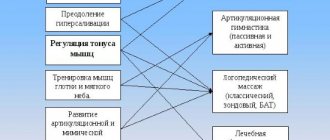Forced to protest
When a child grows up and understands that his parents’ experiences limit his freedom, development and self-realization (this can happen, for example, in early adolescence, from the age of 10), he will begin to organize riots and protests. Constant conflicts and scandals will become a common form of communication. And either the child will cope with the parents’ anxiety and be able to move through life successfully and confidently, or the parents will win, and their child will turn into a little old man who comments on everything, fears everything and strives for nothing.
From a very early age, trust your children - after all, they have a powerful instinct of self-preservation, they are not as helpless as they might seem. Teach them the rules of behavior in a variety of situations, allow them to make mistakes, be there, support, help. But don’t limit or scare! Then the child will have enough strength to live a full life and feel comfortable.
Calm, just calm! Maternal anxiety is familiar to almost all mothers. At least once in her life, every woman went crazy because of caring for a child and because of fear for him.
Boil dishes for your child until his fifth birthday. Okay, okay, up to three years!
Bathe your baby exclusively in boiled water. You won't believe it, but it happens!
You panic if your child refuses to have breakfast before kindergarten;
Do not have pets because you are afraid of infections;
When it’s 20 degrees Celsius, put your baby in warm overalls and a hat for a walk;
You are afraid to let your baby fly freely, in case he suddenly falls down a slide or falls down the stairs (that’s why you insure him everywhere or don’t let him explore the space on his own);
You take your three-year-old to endless educational activities and worry that he hasn’t learned to read yet;
Maintain perfect, almost sterile cleanliness in the house;
Call a doctor immediately if your child has a temperature of 37 degrees;
You will never get a nanny because you will not trust a stranger with your blood;
You are afraid to give your child to your grandmother for a couple of days (after all, no one but you knows how best to treat your baby).
Are you familiar with these situations? Welcome to the anxious moms club. Most likely, you are hyper-responsible and have everything under control; you manage to do a million things in a unit of time. The diapers have been washed and ironed, there is organic vegetable soup for the baby on the stove, and you are practically the perfect mother! And you are probably familiar with the feeling of constant tension and anxiety that you are not doing something in time or doing something wrong. You sleep very lightly or do not get enough sleep, you have disturbing dreams, you are afraid to watch the news on TV, you constantly think that an accident will happen to your child. And you are often afraid to make a mistake.
I was scared, I admit. Especially with the first child. Yes, I’m scared with the third one, so what’s there to hide? Despite the fact that there is much more experience and knowledge.
Fear and anxiety are very exhausting, depriving motherhood of joy and pleasure.
Why does this happen and where does maternal anxiety “grow” from?
Causes of maternal anxiety
Lack of experience and knowledge.
You have your first child, you don’t understand what to do with him or how he works.
In this case, everything is in order; lack of knowledge in our time is an easily solvable problem.
But I suspect this reason is too simple to be true. There are usually deeper psychological processes behind anxiety.
You yourself had an anxious mother.
Do you remember that you were not allowed to leave the house without a hat, drink milk from the refrigerator or walk without warm pants in April. For example, I was forbidden to go to the equestrian sports section, because “you never know what’s there” or “I heard that one girl there broke her spine after falling from a horse.” I remember my mother’s panic and helplessness well. She knew so little, was very childish and distrusted the world and herself so much that she defended herself with control and prohibitions.
Because it’s easier to prohibit or play it safe than to experience constant anxiety and uncertainty.
The bad news is that maternal anxiety and control are passed on to children as a way of life. This happens completely unconsciously. An anxious mother is likely to have an anxious child. And as an adult, he can hear that same mother’s voice inside - “don’t drink milk from the refrigerator!” or “put on a hat - you’ll catch a cold!” Only this voice will no longer be addressed to himself, but to his child.
Social pressure.
The younger and more inexperienced the mother, the more she trusts attitudes and values that are contradictory or erroneous, but at the same time socially supported, such as the value of early childhood development.
Take a closer look, probably half of the mothers on your playground are panicking because the child does not want to learn to read at 3 years old or does not count to one hundred!
And the more worried they are, the more actively they take the kids to various English clubs or early development schools.
How can one not succumb to mass influence? Everyone drives, but I don’t? Am I missing something? How can we prepare him for school now? Everyone is cooking, so it’s right. But mine doesn’t work! Does that mean I'm a bad mother? Tension and anxiety immediately rise. Sound familiar?
The difficulty is that, for all its harmfulness, both for mother and child, increased anxiety is usually poorly understood.
And really, how can I understand that I’m going too far if I live like this all my life? If hyper-control and hyper-care are the norm for me? How to change the system using the tools of the system itself?
It's quite difficult, but possible. Firstly, with the help of a psychologist. And secondly, there is an independent way to discover it in yourself, for example, try to focus on your own feelings. A feeling of constant fatigue, tension, insomnia, uncertainty about the correctness of one’s actions, self-criticism, and the desire to do everything perfectly are the most striking markers of increased anxiety.
How to get rid of excessive anxiety
So, you are an anxious young mother. Exhausted and tired. And you realize that you are overly anxious and thereby create problems for both yourself and the baby. What to do? I’ll say right away that advice in the spirit of “stop worrying and start living” does not work. It is impossible to simply stop doing something that is very deeply built into our lives. If it were that easy, then what would be our problem? But you can help yourself, support yourself, knowing that you are built in an alarming way.
My life hacks as a psychologist and as a mother of many children are as follows:
1. Awareness and observation.
I realize that I'm generally an anxious mom, which means I tend to throw myself into panic mode out of the blue. And then every time the anxiety arises, I say to myself: “Stop! What's happening now?
Such a stop makes it possible not to automatically fly into a familiar scenario, but to slow down, comprehend what is happening and make a choice. Understanding and knowing about your anxiety helps you make adjustments to the wind. Will there really be a disaster if the grandmother takes the child with her for two days? Or is the scale of the negative consequences not so great and I rather panic, because in general I am prone to anxiety?
Warning signs
A child with increased anxiety is easy to spot in a group of children.
- He keeps to himself, is withdrawn, insecure, on guard, speaks very quietly and timidly.
- Constantly seeks the approval of other people because he has low self-esteem.
- He finds it difficult to build relationships with other people.
- Perceives the world around him as something hostile and unpredictable. He sees the future as dark and full of dangers.
- The child is constantly depressed, almost always in a bad mood, and rarely takes part in games with peers.
An anxious child has difficulty concentrating, sleeps poorly, is afraid of new things, and gives in to difficulties and problems. Due to frequent worries, he is tormented by headaches, nightmares, abdominal pain, and sometimes, with very strong anxiety, palpitations occur.










